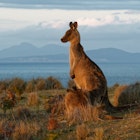
7 life lessons I learned hiking Tasmania's Overland Track

Apr 26, 2021 тЂ 4 min read

The wooden boardwalk, which winds through bush land at Cradle Mountain. ТЉFatschnaus/Shutterstock
The Overland Track isnтt just an incredible adventure in one of the worldтs most spectacular Unesco-listed wilderness areas, but also a unique opportunity to gain some life perspective.
They say you havenтt done the Overland Track т a 65-kilometre bushwalking trail in Tasmania and one of Australiaтs most iconic walks т if you havenтt suffered. But this is part of the appeal for the 9000 people who sign up to hike it, typically over six days, every year.
Here are just a few lessons we can learn from the Overland т and any multi-day hike for that matter т that offer parallel lessons for our everyday lives.

Itтs not always about the end goal
Sometimes weтre so set on reaching a certain point in our lives т from nailing that promotion to having a baby т that we forget to enjoy the journey. But when you hike into the wilderness, leaving digital connectivity and other real-world distractions behind, mindfulness comes easy. Itтs the ultimate affirmation that slowing down to smell the roses т or in the case of the Overland Track, marvel at the spectacular scenery т has a tangible effect on our mental health. For me, setting an intention to spot 20 fungi species in a day was the perfect exercise in being present.

Preparation is key
Sometimes itтs fun to wing it. But you donтt have that luxury on a multi-day hike. On the Overland Track т where itтs possible to experience snow on the trail even during summer т your packing prep has the potential to influence life and death. While this doesnтt necessarily mean you must put in serious prep for every aspect of your life, the lesson here is that being organised can take you far.
Do not pack all you think you need
With most multi-day hikes requiring you to carry everything youтll need for the entire trip, youтll find yourself scrutinising every item you pack. This opens our eyes to the fact that we donтt actually need very much stuff to survive, and by putting a similar level of thought into our everyday purchases, we can help prevent the planet from carrying a similarly unnecessary load.
Youтre stronger than you think
I was nervous about attempting the Overland Track, which links Cradle Mountain with Lake St Clair in Tasmaniaтs central northwest, during a period of my life when I was feeling a bit physically and mentally run down.

But on the fourth day, I shot up Mt Ossa (1617m), Tasmaniaтs highest peak, ahead of my hiking group. It was a great reminder that weтre only as capable as we believe ourselves to be. And if we give into fear and avoid daunting prospects, weтll never know how capable we can be.
Leaving no trace is just the beginning
Punctuated by soaring dolerite peaks, serene blue tarns and moss-covered pockets of temperate rainforest, the breathtaking natural backdrop to the Overland Track is among the most pristine corners of the planet. Being immersed in wilderness areas like this on a multi-day hike highlights the importance of these precious ecosystems т to people and the planet т and our responsibility to protect them well beyond limiting our negative impact on the trail.
How to think on your feet
With only yourself and the contents of you rucksack to rely on, multi-day hikes can put your problem-solving skills to the test. Got a tear in your tent? Patch it with sports tape. Wet socks? Fill your water bottles with boiling water and wrap your socks around them to help them dry.

When you donтt have the option of asking ask Siri for help, your inherent resourcefulness may surprise you.
The value of self-care
Thereтs no glory in pushing yourself beyond your physical limits on a multi-day hike. In fact, itтs a safety risk. If youтd love to hike the Overland Track but youтre not up to carrying your tent, sleeping gear and food, for example, you can book the , which will see you retreat each night to a cosy, eco-sensitive private hut where your expert guides morph into chefs. Is it cheating? Maybe. But if it keeps you safe and brings you joy without negatively impacting other people or the environment, who cares? Itтs a top motto for life.
Sarah visited Tasmania with support from , and .
You might also like:
I spent the past year taking Aboriginal tours - here's what I learned
Learning from Australiaтs Indigenous storytellers
Australian adventures that give back to the land and people
Explore related stories



 Hiking15 epic hikes in Australia and New Zealand among volcanoes, rainforests and more
Hiking15 epic hikes in Australia and New Zealand among volcanoes, rainforests and moreAug 5, 2022 тЂ 12 min read
 Wildlife & NaturePerfect plunges and heavenly hikes in Australiaтs Northern Territory
Wildlife & NaturePerfect plunges and heavenly hikes in Australiaтs Northern TerritoryMay 21, 2021 тЂ 5 min read

 Family TravelРЯАФУХСљКЯВЪПЊНБМЧТМ writers look ahead to 2021 and the first trips they can take
Family TravelРЯАФУХСљКЯВЪПЊНБМЧТМ writers look ahead to 2021 and the first trips they can takeDec 18, 2020 тЂ 11 min read


 Wildlife & NatureA first-timerтs guide to visiting Australiaтs Fraser Island
Wildlife & NatureA first-timerтs guide to visiting Australiaтs Fraser IslandAug 4, 2020 тЂ 6 min read
